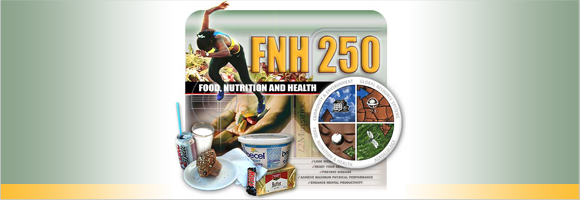
Course Description
The primary objective of FNH250 is to introduce students to fundamental concepts and principles of nutrition by exploring current nutrition issues of relevance in their lives. FNH 250 uses a Problem-Based Learning format where you will work in groups of 5-7 students, using on-line discussion forums facilitated by an instructor, to address a series of nutrition problems or cases. Through progressive disclosure of information, each case will be structured to allow you to share what you already know about the topic and identify the additional knowledge needed to solve the problem. You will research the learning issues individually, share what you have learned, and work together to solve the problem. Resources available to you will include a textbook, self-study quizzes, and suggested web-links. Note: Computer and Internet access are required.
Course Objectives
Upon the completion of the course, you will be able to:
- name and describe the characteristics, physiological functions,and food sources of essential nutrients;
- discuss the adverse effects of both inadequate and excessive intakes of nutrients;
- understand the concept of nutrient requirements and how these are translated to recommendations for intake of nutrients and foods;
- apply your knowledge by assessing the adequacy and balance of food consumption patterns of healthy adults;
- critically assess current nutrition fads and controversies
Course Overview
Orientation and Introductions
Possible Topics/Problems
- Stephanie’s Eating Habits
- Butter or Margarine? Olive Oil or Canola?
- The Vegetarian Athlete
- Eating Well for Optimal Health
- Reviewing Canada’s Food Guide to Healthy Eating
- Mediterranean Survivor
- The West Coast Trail
Course Work
Participation in group work will be assessed on a pass/fail basis. If you do not participate in group discussions, you will not pass the course. Your participation will be assessed on an on-going basis by yourself, your peers, and your tutor. If at any point in the course the tutor or your peers feel your participation is inadequate, you will be made aware of this immediately, and will be able to discuss with the tutor and your group how you can improve your participation. You will not get to the end of the course and learn for the first time that you have failed because of inadequate participation.
The written assignments will be based on each of the 5 cases that comprise this course, and will be due one week after completing the case. Each assignment will consist of a written report presenting information arising from the case. Details about the length, content and format of the assignment will be presented in the context of the case. Assessment of assignments will be based on completeness and accuracy of content as well as clarity and form of writing (e.g., formatting, grammar, spelling, structure, flow of ideas).
The final exam will be an open book exam, consisting of two parts. The first part will include multiple choice and short answer questions similar to those in the self-study quizzes provided for each case. The second part will require you to interpret an analysis of your own diet. To prepare for the exam, you will need to complete a 3-day food record and analyze it using the nutritional analysis software required for the course. You must bring the computer printouts to the exam to use in answering the questions in the second half of the exam and to hand in with the exam.
Evaluation
| Group work |
pass/fail
|
| Completion of all 3 case evaluations and the course evaluation |
5%
|
| Written Assignments (3 assignments, worth 15% each) |
45%
|
| Final exam |
50%
|
Learning Resources
The materials for this course consist of the FNH 250 website (which contains the course contents, website activities, and assignments), textbook and diet analysis software (available as package at the UBC Bookstore).
3 item PKG : Thompson, Janice, Manore, Melinda & Judy Sheeshka, Nutrition (2nd Canadian Ed.) with MyNutritionLab and MyDietAnalysis 3.0. ISBN 9780321746160
